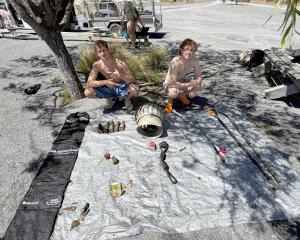Last month the Otago Regional Council compiled a report outlining potential solutions for polluted areas, which would inform its air quality strategy.
Central Otago consistently receives high air pollution ratings because of wood burner use and temperature inversions, in which warm air traps cold and smoky air near the ground.
On Tuesday and Wednesday Alexandra's daily average air pollution levels were 116PM10.
Anything over 50PM10 is considered a high pollution day.
Milton also receives high ratings, with 15 high pollution days in the past two months.
Otago Regional Council engineering, hazards, and science director Gavin Palmer said it would test the feasibility of community heating schemes in which heat was distributed through pipes to the community or district.
"District heating plants can provide higher efficiencies and better pollution control than individual dwelling heating options.''
They would generate heat locally for space and/or water heating in dwellings, he said.
Burning fossil fuels or wood is often used to fuel the schemes, although geothermal, heat pumps and central solar heating could also be used.
Alexandra-based research company Bodeker Scientific was investigating the technical feasibility of using the Clutha River as a potential source of energy for such a system, he said.
"The project is based on the idea of using water-sourced heat pump technology to generate enough heat to supply a small town such as Alexandra.''
There are no residential district-heating schemes in New Zealand.
The council would examine the possibility of other solutions such as ultra-low emission burners and secondary emission controls for wood burners, he said.
Air pollution readings overall were lower last year than this year as it was generally windier due to the effects of El Nino on weather patterns, Dr Palmer said.
"This year, things look to be on track for an average pollution year. Even though it's been relatively mild, evening temperatures in Central Otago are still reaching as low as -6degC on some nights.''
The pollution could cause adverse health effects such as strokes, heart disease, lung cancer, and respiratory disease, including asthma, he said.
For fire heating the council recommends using dry wood or good-quality coal, using kindling and adding large pieces of wood only once there is a good bed of embers, and leaving air controls open for about 20 minutes to build up a good temperature.
It also suggests not letting woodburners or fires smoulder, as it releases higher levels of particles and organic compounds, which are bad for human health.
High pollution days so far this year
Cromwell: 20
Alexandra: 18
Milton: 15
Arrowtown: 12
Clyde: 7
Dunedin: 0












